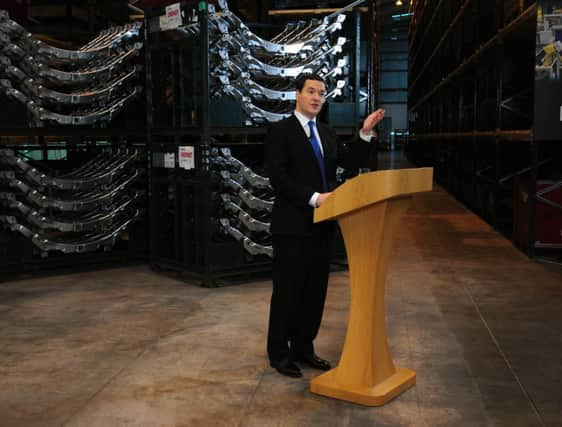Leaders: Tory sweeteners are still to come


George Osborne did the opposite yesterday, telling voters that a further £25 billion will have to be cut from welfare spending. Does this mean that the Conservatives are bound to lose come polling day in 2015?
Not necessarily. The Chancellor put the blame for the necessity of spending cuts firmly on the Labour Party and its stewardship of the economy. This is a theme that will be aired endlessly by the Conservatives over the next 16 months, the implied message being that, since Labour politicians got the country into this mess, they cannot be trusted to get Britain out of it.
Advertisement
Hide AdAdvertisement
Hide AdA second message is that while the Tories were keen to say late last year that the economy had reached a turning point and are backed by most independent economists in their view that the recovery is gaining momentum, the state of the annual deficit means there can be no relaxation of spending austerity.
Still, as the welfare budget is now about £166bn, removing £25bn from it will be a stiff task and implies a great deal of hardship is yet to come for some of the poorest people in Britain. Removing housing benefit from the under-25s accounts for only £2bn at most, while the idea of restricting entitlement to live in council housing to those earning less than £65,000 a year saves next to nothing.
And yet, since welfare payments are minimal or nil for the majority of voters who are more conscious of the taxes they pay to support the welfare state, opinion polling suggests that the Conservatives are more trusted than Labour to handle welfare fairly. And that gives the coalition’s Liberal Democrat partners room to accuse their Tory other halves of being unfair and extreme. Nick Clegg, the Deputy Prime Minister, rose swiftly to the rostrum yesterday to say his party would put greater emphasis on raising taxes from the rich.
This is an interesting, perhaps refreshing, reversal of the conventional wisdom of the Blair era – that to win elections, parties had to rush to the centre ground. That, to many people, had the side-effect of making the major parties indistinguishable from each other.
It would be good for voters to see clear policy differences between ballot box choices. That, however, is most unlikely to be the case in 2015. The Tories are clearly relying on voters’ continued acceptance of the importance of cutting the deficit. But it still seems improbable that they will be campaigning entirely from a high ground built on spending hair-shirts and economic straitjackets. Still to be factored into calculations is the effect of faster economic growth and better- than-forecast tax revenues. If that is indeed the case, prepare for tax sweeteners rather than reductions in austerity.
Legal aid reform needs work
Implementation of changes to legal aid, which would have entailed all but the completely penniless paying something to the costs of being defended in a criminal case, has been stalled. The threat by lawyers to refuse to represent anyone who did not pay their contribution before the case was heard in court has clearly had an effect.
It was a shame that it took such a threat to make the Scottish Government pause, but it is right that it has done so. The prospect that many people would have to defend themselves rather than have a properly qualified lawyer appear on their behalf or to go without any defence at all was a very real one. If it had manifested itself, the chances that there would have been subsequent appeals, miscarriages of justice, people wrongly convicted, and further burdens heaped on the legal system to the detriment of the demands of justice were extremely high.
Since the main purpose of the reform was to save some taxpayers’ money, and only incidentally to make more people realise that a legal defence costs money, the reform risked defeating its own purpose.
Advertisement
Hide AdAdvertisement
Hide AdLawyers should not have a free hand to milk the legal aid system, but neither should they be expected to exercise their skills for free. There is some merit in their claim that the Scottish Legal Aid Board may have expected them to bear the cost of defending people who were either unwilling or unable to pay a contribution.
The Scottish Government, now that its plan for payment of contributions is law, says that it still intends to proceed with the reform. But better thinking on how that can be done without damaging the justice system is clearly required.